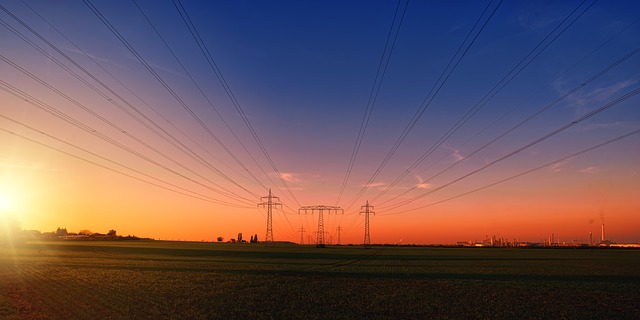Power generation
The term 'power generation' describes the process of generating electrical power. Types of power generation include:
- Fossil fuel thermal energy such as coal or natural gas.
- Biogas energy.
- Geothermal energy.
- Hydroelectricity.
- Wind energy.
- Solar thermal energy.
- Tidal energy.
- Photovoltaics.
- Nuclear energy.
- Chemical energy generated from fuel cells, batteries, and so on.
Power stations are normally located away from centres of population where fossil fuels are abundant or good transport links exist. Many of these locations are well away from the towns and cities where the electricity is used and hence there is a need for electricity transmission and distribution.
The national power supply network is managed by four types of organisation:
- Generators - responsible for producing the electricity.
- Suppliers - responsible for supply and selling electricity to consumers.
- Transmission network - responsible for the transmission of electricity across the country.
- Distributors - those who own and operate the local distribution network from the national transmission network to homes and businesses.
Microgeneration is the local production of power on a very small scale in comparison to the typical output of a power station.
Consumers can qualify for an ‘export tariff’ by selling surplus electricity back to their supplier. Allowable technologies are:
- Solar photovoltaic panels.
- Wind turbines.
- Water turbines.
- Anaerobic digestion (biogas energy).
- Micro combined heat and power (micro-CHP).
NB Net Zero by 2050, A Roadmap for the Global Energy Sector, published by the International Energy Agency in May 2021, suggests that power generation: ‘Refers to fuel use in electricity plants, heat plants and combined heat and power (CHP) plants. Both main activity producer plants and small plants that produce fuel for their own use (auto-producers) are included.’
[edit] Related articles on Designing Buildings
- Arcing.
- Building an electrical grid for our times.
- Dispatchable generation.
- Electricity supply.
- Energy consumption.
- Energy storage.
- Engineering Recommendation G99.
- Fossil fuel.
- Hydroelectricity.
- Micro-grids.
- Microgeneration.
- Oil - a global perspective.
- Power.
- Renewable energy.
- Smart Export Guarantee SEG.
- Solar photovoltaics.
- Substation.
- The future of UK power generation.
- Types of fuel.
- Using P-DfMA to decarbonise coal-fired power stations.
- Watt.
Featured articles and news
Construction Skills Mission Board launch sector drive
Newly formed government and industry collaboration set strategy for recruiting an additional 100,000 construction workers a year.
New Architects Code comes into effect in September 2025
ARB Architects Code of Conduct and Practice available with ongoing consultation regarding guidance.
Welsh Skills Body (Medr) launches ambitious plan
The new skills body brings together funding and regulation of tertiary education and research for the devolved nation.
Paul Gandy FCIOB announced as next CIOB President
Former Tilbury Douglas CEO takes helm.
UK Infrastructure: A 10 Year Strategy. In brief with reactions
With the National Infrastructure and Service Transformation Authority (NISTA).
Ebenezer Howard: inventor of the garden city. Book review.
The Grenfell Tower fire, eight years on
A time to pause and reflect as Dubai tower block fire reported just before anniversary.
Airtightness Topic Guide BSRIA TG 27/2025
Explaining the basics of airtightness, what it is, why it's important, when it's required and how it's carried out.
Construction contract awards hit lowest point of 2025
Plummeting for second consecutive month, intensifying concerns for housing and infrastructure goals.
Understanding Mental Health in the Built Environment 2025
Examining the state of mental health in construction, shedding light on levels of stress, anxiety and depression.
The benefits of engaging with insulation manufacturers
When considering ground floor constructions.
Lighting Industry endorses Blueprint for Electrification
The Lighting Industry Association fully supports the ECA Blueprint as a timely, urgent call to action.
BSRIA Sentinel Clerk of Works Training Case Study
Strengthening expertise to enhance service delivery with integrated cutting-edge industry knowledge.
Impact report from the Supply Chain Sustainability School
Free sustainability skills, training and support delivered to thousands of UK companies to help cut carbon.
The Building Safety Forum at the Installershow 2025
With speakers confirmed for 24 June as part of Building Safety Week.
The UK’s largest air pollution campaign.
Future Homes Standard, now includes solar, but what else?
Will the new standard, due to in the Autumn, go far enough in terms of performance ?
BSRIA Briefing: Cleaner Air, Better tomorrow
A look back at issues relating to inside and outside air quality, discussed during the BSRIA briefing in 2023.
Restoring Abbotsford's hothouse
Bringing the writer Walter Scott's garden to life.
Reflections on the spending review with CIAT.


























